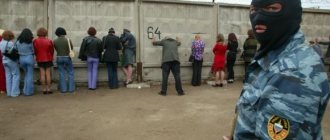1. Involvement in prostitution or coercion to continue prostitution -
shall be punishable by a fine in the amount of up to two hundred thousand rubles, or in the amount of the wages or other income of the convicted person for a period of up to eighteen months, or by restriction of liberty for a term of up to three years, or by forced labor for a term of up to three years, or by imprisonment for the same term.
2. The same acts committed:
a) with the use of violence or the threat of its use;
b) with the movement of the victim across the State Border of the Russian Federation or with his illegal detention abroad;
c) by a group of persons by prior conspiracy, -
shall be punishable by imprisonment for a term of up to six years, with or without restriction of freedom for a term of up to two years.
3. Acts provided for in parts one or two of this article, committed by an organized group or in relation to a minor, -
shall be punishable by imprisonment for a term of three to eight years with or without deprivation of the right to hold certain positions or engage in certain activities for a term of up to fifteen years and with or without restriction of freedom for a term of up to two years.
- Article 239. Creation of a non-profit organization that encroaches on the personality and rights of citizens
- Article 240.1. Receiving sexual services from a minor
Corpus delicti
Public danger of the crime provided for in Art. 240 of the Criminal Code of the Russian Federation, consists of inducing persons to engage in criminal business.
To achieve their criminal goals, proton organizers use various methods:
- confiscation of documents from victims;
- slavery;
- retention of victims in brothels and outside the Russian Federation;
- battery, etc.
The legislation of the Russian Federation considers the organization of prostitution a more dangerous crime than prostitution itself. The reason for this is the fact that the prostitute does not attract anyone to her profession, so her crime is not aggravated by this episode.
Involvement in prostitution refers to actions against a person or group of people that are committed with the aim of attracting them to provide intimate services for money or material assets, including food and overnight stay. Thus, by involving people in prostitution, the criminal facilitates the sale of sexual services.
As constructive features of an offense, the law specifies the methods of its commission. Art. 240 of the Criminal Code of the Russian Federation defines all these signs.
The main object of such an offense, as mentioned above, is public morality in the sexual world. The crime also includes other objects: freedom and inviolability of the sexual sphere of citizens, their health. The objective side involves the active involvement of new people in prostitution and the retention of old ones in the prohibited business.
The subject in this case is a recognized sane individual who has reached 16 years of age.
For example , 17-year-old Mr. V.U. from Voronezh was convicted under Art. 240 for engaging a 15-year-old girl in prostitution. The fact is that, according to the article we are considering, a sane citizen who is already 16 years old is considered a criminal.
The subjective side implies direct intent. The nature of the purpose and motive of the crime are not taken into account when investigating this crime.
Arbitrage practice
Quite often in practice, controversial and ambiguous situations arise in the interpretation of the norms that are provided for in Articles 240 and 241 of the Criminal Code. When analyzing judicial practice, it becomes clear that involvement in prostitution and the organization of this activity raise problems associated with the qualification of these criminal acts by the courts of first instance, including in the presence of a group form of complicity, or in the case of a combination of crimes.
There is no explanation from the Supreme Court of the Russian Federation regarding the application of these norms of criminal law in practice in the form of a resolution of the Plenum. In this regard, the analysis of the position of the Supreme Court seems to be the most relevant and complete. The Judicial Collegium existing in criminal cases notes a number of errors made by the first instance in qualifying the actions of criminals. Taking into account this position, the following rules can be formulated for the law enforcement officer.
- If there is a group involvement in prostitution and its organization, then the actions of the accomplices should be classified as one form of complicity. It would be an error to assess the actions of one of the participants, for example, as part of an organized crime group, and the other as participating in a criminal community or by prior conspiracy by a group of persons.
- The actions of the organizer of the crime should be qualified as actual execution, without reference to Article 33 of the Criminal Code, when committed together with other participants as part of an organized group.
- Involvement in prostitution and subsequent coercion to continue this activity in relation to one victim should be assessed as a single crime. However, when assigning punishment, each action must receive an independent assessment and a measure of criminal impact in the sentence.
Qualifying features
According to Art. 240 of the Criminal Code of the Russian Federation, the corpus delicti includes qualifying features.
Among the signs:
- a group of persons united by a common criminal intent;
- transporting a person (without his consent) across the border of the Russian Federation or illegally detaining him abroad;
- use or threat of violence;
- inducing minors into prostitution.
Group of persons
A group of persons united by prior conspiracy is a group of criminals from two people who agreed in advance to commit a crime.
For example, a group of three people deliberately recruited unemployed women in villages for prostitution. To do this, they visited drinking establishments and met single women.
The criminals promised potential “employees” decent earnings and the opportunity to go to the city. Such a crime is considered to be committed by a group that acts by prior conspiracy.
Export outside the Russian Federation and violence
Transporting a victim across the state border of the Russian Federation without his personal consent means that a person, misled or not aware of his actions, leaves the country to engage in prostitution in other countries.
It also happens that people are taken out against their will. When illegally moving across the state border of the Russian Federation, the actions of attackers are taken into account in the totality of crimes that are specified in Art. 240 and p. 322 of the Criminal Code of the Russian Federation (illegal crossing of the state border of the Russian Federation, which is punishable by up to 6 years).
Example. The women were invited to work in China, where a modeling agency was supposed to sign a contract with them. In fact, after arriving in the country, their passports were taken away and they were placed in a brothel. Women were forced into prostitution and gave their income to brothel owners. The fact was revealed only when one of the clients turned out to be Russian and learned the story of his compatriots.
Prostitutes are often detained outside the Russian Federation after their documents are taken away. They are also subject to psychological pressure, they are threatened, blackmailed, beaten, and kept under conditions of slavery.
Involvement of minors in prostitution
The qualifying feature of a criminal act against a citizen who has not reached the age of majority indicates that a minor citizen (a person who has not reached the age of 18) is intentionally involved in prostitution or is forced to continue to engage in prostitution.
“Intentionally” means that at the moment of the action, which forms the objective side of the crime, the attacker knew about the specific age of the person whom he was inducing into prostitution. The goals of a crime can be different and are not recognized by the court as mandatory elements of a crime.
Attention! Involving minors in prostitution is a particularly serious crime. The social danger of this crime lies in the fact that minor children are involved in providing sexual services for a fee.
The objective side of the crime is the actions of the criminal, which are aimed at obtaining sexual services provided to minors aged 16 to 18 years for a reward or the promise of a reward. It does not matter to whom the remuneration is paid: to the minor providing intimate services or to a third party.
Example. A resident of Saratov, Mr. A.V., met the minor Mr. U.N. on a social network. During the conversation, he learned that the girl lived with her grandmother and was in dire need of money. Mr. A.V. invited her to engage in prostitution, promising to independently find clients and bring the girl to meet them in a country house. For the work, the attacker had to pay her from 3 to 6 thousand rubles. After Mr. A.V. did not pay money to Ms. U.N., she complained about the acquaintance to her grandmother. He was later convicted despite the fact that he did not pay the girl any money, but only promised to pay.
Receiving sexual services from a minor is acts of a sexual nature with a girl or boy aged 16 to 18 years without the use of violence. The condition for such actions is remuneration (money, valuables, food, overnight accommodation), as well as a promise to pay for the services. The victims in this case can only be a teenager aged 16 to 18 years.
The problem of qualifying an organization and engaging in prostitution is that it can be difficult to determine whether a person was persuaded to prostitute or whether he entered the criminal business voluntarily.
Lawyer under Art. 241 of the Criminal Code of the Russian Federation Organization of prostitution
Lawyer under Art. 241 of the Criminal Code of the Russian Federation Organization of prostitution is necessary for those who are subject to criminal prosecution under this article. Protection under Art. 241 of the Criminal Code of the Russian Federation is based on deep practical experience of defense in criminal cases. The lawyer, not only at the level of theoretical knowledge of the criminal process, but also based on many years of practice, will explain to the client all the nuances and guide him along the right path. A call to a lawyer can change the situation in a positive direction. Therefore, timely request for legal assistance contributes to the possibility of using a wider range of defense methods in criminal proceedings than when entering the case at a later stage. Call a lawyer immediately as soon as you are faced with the question of seeking protection from criminal prosecution. You can do it right now! The telephone number of a criminal lawyer is listed on the website.
Responsibility under the article
Involvement in prostitution or coercion to continue prostitution, according to Art. 240 of the Criminal Code of the Russian Federation, punishable by a term of 3 to 8 years.
The punishment for the crime committed by the attacker depends on a number of factors given in the table.
| Part of the article | Intended punishment |
| part 1 | fine up to 200 thousand rubles |
| a fine in the amount of the offender’s salary or income for a period of up to 18 months | |
| restriction of freedom up to 3 years | |
| community service up to 3 years | |
| imprisonment up to 3 years | |
| part 2 | imprisonment for up to 6 years and supervision for up to 2 years |
| imprisonment for up to 6 years without further supervision | |
| Part 3 | imprisonment from 3 to 8 years with restriction of professional rights to 15 years |
| imprisonment from 3 to 8 years without deprivation of professional rights | |
| imprisonment from 3 to 8 years with supervision for up to 2 years | |
| imprisonment from 3 to 8 years without further supervision |
Criminal legislation provides only real terms for articles regulating punishment for involvement in prostitution, if the suspect’s guilt is proven. Cases under Art. 240 of the Criminal Code of the Russian Federation attracts special attention from the prosecutor's office and the Investigative Committee of the Russian Federation.
Convicted under Art. 240 of the Criminal Code of the Russian Federation can be released upon expiration of the sentence or on parole in the absence of violations of the regime of detention and the presence of incentives from the administration of the correctional institution.
Comments on the article
First, you need to understand what meaning the legislator puts into the phrase “prostitution.” According to the comments, this is the systematic (more than 2 times) entry of male or female persons into sexual relations for a certain fee with clients. Prostitution can be characterized by several characteristics. These include the systematicity (regularity) of sexual relations, the absence of their conditionality by marriage, the presence of different clients, and the receipt of remuneration regarded as more or less regular income. In this case, partners can be of any gender, and the form of the relationship and the type of remuneration do not matter when defining the concept of “prostitution”. This activity is not considered a crime, but is recognized as an administrative offense.
In accordance with the comments to Art. 240 of the Criminal Code of the Russian Federation, the involvement of a victim in prostitution is regarded as actions aimed at creating in the person a desire or desire to perform these actions, or obtaining consent. In this case, the methods can be different: promises, persuasion, blackmail, threats, etc.








